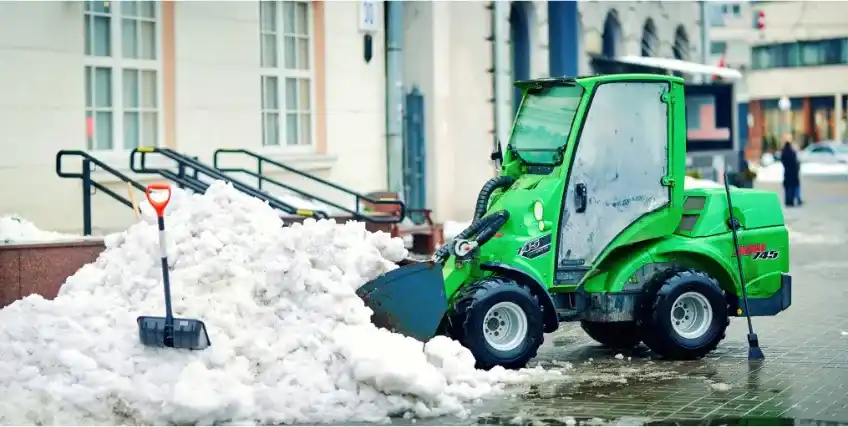How Landscaping and Snow Removal Companies Use Equipment Financing to Balance Cash Flow
September 2, 2025 | Last Updated on: September 2, 2025

Landscaping and snow removal companies have one thing in common – they rely heavily on the seasons. When summer rolls in, landscapers see long workdays filled with lawn care contracts, tree trimming jobs, and new outdoor projects. But as winter takes over, their equipment often sits idle, and the cash flow slows. Snow removal businesses face the opposite problem – short bursts of high demand followed by months of downtime.
That's where equipment financing for business steps in. Instead of tying up cash in large purchases, companies spread the cost over time with flexible financing solutions. It allows them to make predictable monthly payments while preserving cash for payroll, fuel, and other business needs. Whether it's buying new equipment, upgrading old machines, or leasing during peak seasons, financing offers an option that balances affordability with readiness.
In industries that are weather-reliant, stability matters. Access to the right equipment, without crushing upfront costs, is what helps seasonal businesses stay prepared all year long. By using equipment financing for business, landscaping and snow removal companies can ensure they're ready for every season's demands without jeopardizing cash flow.
Why Equipment Costs Can Sink Seasonal Companies
For landscaping and snow removal companies, the cost of equipment isn't just an expense. It's a massive financial hurdle. A single piece of heavy equipment like a skid steer or compact tractor can easily reach $15,000–$120,000 or more. Add trailers, snowplows, or a fleet of commercial mowers, and the investment can cross six figures quickly. For a small business that earns revenue in short seasonal bursts, such upfront spending can be overwhelming.
What makes it tougher is that many machines sit idle for months at a time. Landscapers rarely use snowplows, and snow removal firms don't need riding mowers once winter ends. That downtime still carries costs. Storage, maintenance, depreciation – all of it eats into profits. Paying cash for expensive machinery locks up working capital that could be better spent on payroll, marketing, or emergency repairs.
This is where equipment financing for business becomes not just helpful but necessary. By breaking down costs into predictable monthly payments, business owners can better align expenses with seasonal revenue. It's a way to match cash flow with demand cycles instead of draining reserves in one go. For many, turning to commercial equipment finance gives them breathing room. It allows them to manage multiple pieces of equipment without jeopardizing stability during slower months.
The reality is simple: without financing options, seasonal businesses often end up under-equipped, over-leveraged, or forced to delay growth opportunities. Financing ensures the right equipment is available when it's needed most.
How Equipment Financing for Business Works
When people hear the term equipment financing for business, they sometimes picture a one-size-fits-all loan. Seasonal companies, like landscaping in the summer, snow removal in the winter, need options that adapt to their uneven cash flow. That's why financing programs are designed to cover everything from new equipment to used gear, and even accessories like trailers or storage containers.
At its core, equipment financing for business allows companies to borrow money specifically for equipment purchases. Unlike traditional small business loans, these are tied to the value of the equipment itself. That means the mower, truck, or snowplow being financed usually acts as collateral. This lowers risk for the lender and can sometimes translate into competitive rates for the borrower.
There are several financing options available:
- Loans: Businesses take out a set loan to purchase equipment outright, then repay in fixed monthly payments.
- Equipment Leasing: Useful when companies want flexibility, or need the right equipment only for part of the year. Leasing avoids the burden of ownership while keeping cash flow predictable.
- Lines of Credit: Handy for businesses with fluctuating needs. Instead of one lump sum, owners can draw funds as required to purchase equipment or cover seasonal expenses.
The application process usually reviews eligibility factors like annual revenue, business credit score, and time in business. Some programs may require a down payment, while others offer no-money-down terms. For startups, this can make or break the ability to scale.
Government-backed programs such as an SBA equipment loan add another layer of support, offering longer repayment terms and lower interest rates. By using these financing solutions, small business owners gain access to the right equipment without straining their working capital.
Benefits of Equipment Financing for Seasonal Companies
Seasonal businesses walk a tightrope between busy months and long stretches of downtime. The right financing solutions give them the balance they need to stay competitive without draining reserves. Here's how equipment financing for business helps landscaping and snow removal companies thrive:
1. Cash Flow Stability
When revenue slows in the off-season, large equipment bills can wreck a company's budget. Financing spreads costs into predictable monthly payments. This way, small business owners can match expenses to seasonal income instead of emptying accounts in one shot. By using equipment financing for business, companies keep cash on hand for payroll, fuel, and day-to-day operations.
2. Tax Savings & Depreciation
Section 179 deductions let businesses write off qualifying equipment purchases in the year they're made. Financing still qualifies for these deductions, offering immediate tax relief without upfront spending. Plus, depreciation rules allow companies to recover part of the equipment's cost over time. Pairing these benefits with equipment loans ensures both short-term savings and long-term planning. However, it is advised to consult a tax professional before making any decisions.
3. Access to the Right Equipment
Staying competitive means having modern, reliable machines ready for the job. With business equipment loans or leasing, companies can upgrade to the right equipment more often. Landscapers, for instance, can finance newer mowers that cut time in half, while snow removal contractors invest in stronger plows for heavy winters. Access to financing keeps seasonal firms ready.
4. Preserving Working Capital
Draining savings to buy a $50,000 skid steer can leave a business exposed. Financing protects working capital, ensuring funds are available for marketing, payroll, or emergency repairs. This is why many owners view equipment financing for business not as debt, but as a tool for stability and growth.
Leasing vs. Buying: Smart Choices for Seasonal Operations
For landscaping and snow removal companies, the decision to lease or buy equipment isn't always clear-cut. Both options can support growth, but the right path depends on cash flow, business goals, and how often the gear gets used. With equipment financing for business, owners can structure deals that fit their unique seasonal needs.
1. Leasing for Flexibility
Leasing is often the best route for seasonal firms that need access to expensive machines for only part of the year. With equipment leasing, companies avoid tying up large amounts of cash in ownership. They get predictable monthly payments, often with flexible lease terms, and can trade up to newer equipment as technology improves. For many small business owners, leasing is a financing option that provides breathing room without long-term commitment.
2. Buying for Ownership
Owning equipment outright has advantages too. Once the loan is paid off, the business owns the asset, which can later be resold or repurposed. An equipment loan used to buy heavy equipment means no worries about renewals or lease term limits. Seasonal companies that use machinery year after year may find ownership more cost-effective in the long run. For them, buying with equipment financing for business locks in stability.
3. Hybrid Options
Some companies find success mixing approaches, like buying core equipment while leasing specialty gear. A landscaping business might purchase a mower fleet but lease winter plows. This hybrid strategy allows access to the right equipment without overextending finances. By blending business equipment loans with leasing, owners create customized financing solutions that match both peak and off-peak business needs.
Government Programs and SBA Options
Not every small business owner has perfect credit or the upfront capital to secure equipment. That's why government-backed programs exist. For seasonal industries like landscaping and snow removal, an SBA equipment loan can be a lifeline. It offers longer repayment terms, lower interest rates, and reduced down payment requirements compared to many traditional financing programs.
The Small Business Administration doesn't lend money directly. Instead, it guarantees a portion of the loan through banks or financial institutions. This makes borrowers less risky in the eyes of the bank, improving eligibility for financing. For example, the SBA 7(a) loan can be used for a wide range of equipment purchases, while the SBA 504 program often covers heavy equipment or real estate tied to a company's operations.
Even beyond landscaping and snow removal, SBA-backed loans cover many industries. Trucking businesses, for instance, often use an SBA loan for semi truck purchases. The same approach applies to companies that need snow plows or lawn tractors. By spreading out payments over time, small businesses avoid straining working capital while securing the right equipment for seasonal demand.
Pairing equipment financing for business with SBA-backed loans allows companies to balance affordability with growth. It's a smart way to access the machines they need while keeping cash flow predictable, no matter the season.
How Seasonal Businesses Stay Afloat in the Off-Season
Seasonal industries often face the same challenge – keeping the lights on when revenue dips. Landscaping firms deal with lean winters, while snow removal companies struggle in warmer months. Without proper planning, cash flow dries up quickly. This is where equipment financing for business and other tools step in to keep things balanced.
1. Short-Term Small Business Loans
When money gets tight, short-term small business loans can cover immediate expenses like payroll or maintenance. They're not meant for big equipment purchases, but they bridge the gap until revenue picks up.
2. Seasonal Payment Options
Some financing programs are built with seasonal businesses in mind. They allow deferred or reduced payments during off-peak months. This keeps monthly payments manageable while still ensuring equipment is available when demand returns.
3. Lines of Credit
For ongoing flexibility, lines of credit act like a safety net. Business owners can borrow only what they need, whether it's for fuel, marketing, or emergency repairs.
4. Financing Programs for Stability
From commercial equipment finance packages to SBA-backed programs, structured repayment gives owners confidence. They know their equipment costs won't drain cash reserves during slow months. For seasonal operators, that predictability is the difference between surviving and thriving.
Conclusion
Seasonal companies like landscapers and snow removal contractors face a constant battle with timing. Busy months bring in plenty of revenue, but long stretches of downtime test their ability to manage expenses. Add in the high cost of snow plows, trailers, and mowers, and the financial strain becomes obvious.
That's where equipment financing for business offers a practical path forward. By spreading payments across the year, companies preserve working capital, keep cash flow steady, and still access the right equipment when needed. From traditional loans to equipment leasing or government-backed SBA programs, the financing options available today give small business owners flexibility they simply didn't have years ago.
The message is simple: with smart financing solutions, seasonal businesses don't just survive slow months; they prepare for growth. By choosing equipment financing for business, owners ensure they're ready for whatever the next season demands.
FAQs About Equipment Financing for Seasonal Businesses
1. What is equipment financing for business?
It's a type of loan or lease designed specifically to cover the cost of equipment purchases. Seasonal businesses use equipment financing for business to spread costs into manageable monthly payments instead of paying everything upfront.
2. Can startups qualify for business equipment loans?
Approval often depends on annual revenue, personal credit, and sometimes a down payment. Some financing programs are designed for startups, making it easier to purchase equipment early on.
3. Is commercial equipment finance better than leasing?
It depends on your business needs. Commercial equipment finance is ideal for long-term ownership, while leasing works for short-term or seasonal needs. Many companies use a mix of both.
4. How can SBA loans help with equipment costs?
An SBA equipment loan offers lower interest rates and longer repayment terms than many private loans to qualified applicants. In some industries, such as trucking, companies use an SBA loan for semi truck purchases. Landscaping and snow removal companies use the same programs for mowers, plows, or heavy equipment.
5. Do equipment loans affect cash flow?
By spreading costs into predictable monthly payments, equipment financing for business can help companies protect working capital and balance cash flow during off-peak months.
Frequent searches leading to this page
Term Loans are made by Itria Ventures LLC or Cross River Bank, Member FDIC. This is not a deposit product. California residents: Itria Ventures LLC is licensed by the Department of Financial Protection and Innovation. Loans are made or arranged pursuant to California Financing Law License # 60DBO-35839




